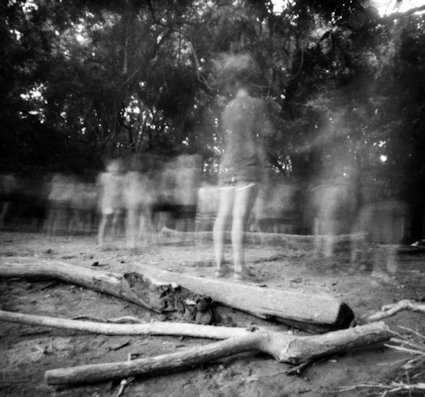 Once upon a time in a summer camp as far north and left as you might go from here, there was not just one crow, but many. There always had been crows in that place.
Once upon a time in a summer camp as far north and left as you might go from here, there was not just one crow, but many. There always had been crows in that place.
There was also a hired groundskeeper who watched after the summer camp cabins, repaired sheds and steps, cleared trails in the woods, trimmed back the encroaching undergrowth, and mowed the lawn in the center gathering place. She mostly liked her job, though it did not pay well. She enjoyed the silence and solitude of the off-season and did not much mind the hordes of children who showed up in the summer to learn about wildlife, sing songs, swim and canoe in the pond, and create useless handcrafts on days when it rained.
This intrusion of children lasted only for a few weeks, and during that summer time the groundskeeper herself could go away if the screaming, teaming children bothered her. And then the autumn would come and the winter with no voices other than her own and the birds.
One spring as the groundskeeper went about her chores, she found the noise of crows particularly vexing. As she was clearing a new trail through the wood, they called and cawed and their cacophony would not let up all day long. Overhead they bounded and flew from branch to branch. Caw caw caw! They shouted at her as she went about her necessary tasks. They spoiled her silent spring with their incessant and harsh calls.
This went on and on until one day the groundskeeper had had enough. She loaded her pellet gun, filled her pockets with ammunition, and went out to put a stop to the noise. She was a good shot, quiet and patient. She walked the trails, hunting for the small black eyes of the black birds, and she shot each one dead. All day long she shot crows until their cries ceased. Perhaps some flew away, but all were gone. Silence regained. The robins and jays remained, but even they were silent for a day.
Now I will ask you: Have crows so annoyed you that you understand or even applaud the groundskeeper’s solution? Do you find it not only legal but reasonable?
Or perhaps you know that crows are thought to be among the most intelligent of animals? Perhaps you know that crows, like human beings, live in extended families. Children stay close to their mothers for years. Perhaps you recognize that the calling of the crows in springtime was likely their effort to warn the groundskeeper away from their babies.
Perhaps you have even heard that “crow funerals” are real. Crows mourn their dead.
Whatever we think, it’s too late to change what happened that long-ago springtime. The robins remain. Gulls fly overhead. Hawks and eagles are protected. The children return.
The murder of crows was done.
__
Jan Priddy’s writing has earned an Oregon Literary Arts Fellowship, Arts & Letters fellowship, Pushcart nomination, MFA, and publication in journals such as CALYX, The Humanist, Liminal Stories, North American Review, and nonfiction anthologies on running and race. She is currently struggling with a utopian science fiction story in which nearly everyone dies. She loves birds.

19 comments
Hayley says:
Sep 23, 2018
I like the clean style and use of white space in this essay. Perfect ending. I really enjoyed it.
Jan Priddy says:
Sep 23, 2018
Thank you, Hayley! I appreciate your kind words.
Andrea Fisk Rotterman says:
Sep 25, 2018
Growing up my family had a pet crow named Blackjack. I love the caw of crows.
Jan Priddy says:
Sep 29, 2018
Thank you for sharing your story! My husband and I talk to crows (and he has a variety of gestures they often respond to). A few weeks ago, I had a lengthy “conversation” with a crow on the beach.
Suzanne Farrell Smith says:
Sep 25, 2018
Oh my. I am struck by how easily “children” and “crows” can be swapped. And by how easily the groundskeeper’s tolerance is swapped for intolerance. And methodical chores swapped for methodical murder. What a piece.
Jan Priddy says:
Sep 25, 2018
Oh, Suzanne, what a deep pleasure to be understood. Thank you for reading!
Suzanne Marshall says:
Sep 28, 2018
Written like a fairytale, yet ringing of nonfiction, I admire your essay and am reminded of Gifts of the Crow by John Marzluff. Have you read it? Like the other Suzanne above, the double meaning of “children” was like kissing thumb and forefinger, perfect fit.
Jan Priddy says:
Oct 3, 2018
I will look for that one.
Zoe says:
Sep 29, 2018
Beautiful piece.
Jan Priddy says:
Oct 3, 2018
Thank you.
R.S. Williams says:
Oct 16, 2018
Oh, my goodness. This is superb. <3
Jan Priddy says:
Dec 2, 2018
Thank you!
Becky says:
Oct 17, 2018
The question I’m left with is this: What is it the crows were saying that she didn’t want to hear? Love that your last line features word play that does justice to what’s come before.
Jan Priddy says:
Nov 25, 2018
Thank you!
Flint says:
Nov 8, 2018
Wow. I love this piece. And that last line… wow.
Jan Priddy says:
Nov 25, 2018
Thank you!
Paul Lamb says:
Jan 4, 2020
I suspect (some) humans have an innate connection with crows. Perhaps we respect their intelligence or their cunning. Perhaps we just admire their physical magnificence. Crows (pairs) appear in several of my stories.
Jan Priddy says:
Jan 5, 2020
?
Jan Priddy says:
Jan 5, 2020
Oh, well, I meant to leave a heart, because , well, just because. Somehow my comments have not come through as I intended. Thank you, Paul.